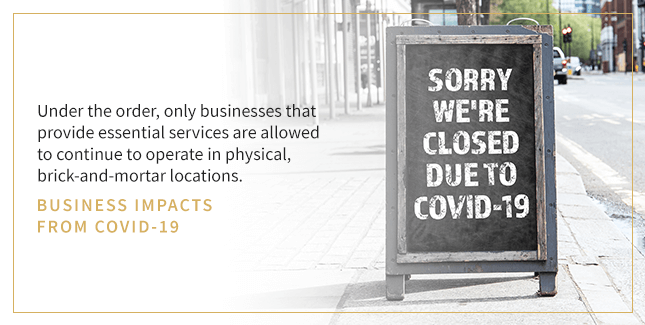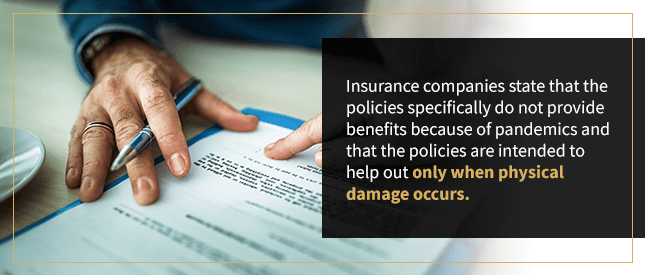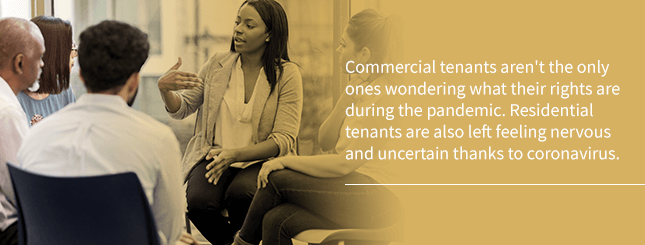Over the first few months of 2020, the coronavirus pandemic has changed the world. By mid-April, the number of COVID-19 cases around the world has risen to over 1.5 million. Efforts to “flatten the curve” and reduce the rate of transmission of the virus has led states and cities across the U.S. to encourage or mandate social distancing practices. In Massachusetts, as in many other states, the government has issued orders telling businesses that do not provide “essential services” to shut down their physical locations.
The enforced closure of businesses for public health and safety has led to notable questions and concerns from business owners, their employees, and the general public. Many who rent are wondering how they will continue to pay. Those who own and lease properties are wondering what they can do about tenants who fall behind on their rent. Business closures have also led many people to lose their jobs, making it difficult for residential tenants to afford rent.
Although the situation is currently unfolding and many changes could be yet to come, there have been some government actions that affect businesses, landlords and residential tenants alike. In this unprecedented time, it helps to take a look at the effects of the pandemic and the coronavirus and what it has meant for businesses, commercial leases, and landlord-tenant laws in the greater Boston area.
Business Impacts From COVID-19
On March 23, 2020, the governor of Massachusetts signed an emergency order that commanded certain types of businesses and workplaces to close down and prohibited gatherings of greater than 10 people. Under the order, only businesses that provide essential services are allowed to continue to operate in physical, brick-and-mortar locations. The order meant that many companies in the greater Boston area and across the Commonwealth of Massachusetts needed to shut their doors and in some cases, stop providing services, at least until early May 2020.
So far, the business impact of coronavirus has affected different industries in different ways. Under Massachusetts’ emergency order, businesses that sell food, such as grocery stores, are allowed to keep brick-and-mortar locations open. But the rules about grocery shopping have changed thanks to COVID-19. Under the governor’s order, from March 25, 2020, stores can only let in 40% of their maximum capacity at any time. The order also recommends that stores encourage shoppers to use delivery or pick-up services, rather than doing their grocery shopping in person.
Also, as part of the order, stores are required to offer people over the age of 60 and others who might be particularly vulnerable to COVID-19 time to do their shopping with limited exposure to other shoppers. Grocery stores across the Commonwealth have been holding senior hours in the early morning, during which those over age 60 or with health conditions are encouraged to shop.
Another effect of coronavirus on supermarkets and essential retailers is that it has caused the Commonwealth to lift the plastic bag ban. While during normal times, many stores encourage the use of reusable bags and can charge for the use of paper bags, today the opposite is true. Reusable bags are now banned in stores, and stores can’t charge for paper or plastic single-use bags
While grocery stores and supermarkets have been allowed to continue to operate during the COVID-19 pandemic, other industries have effectively been shut down by the virus or have had to pivot the services they offer. Across Boston, non-essential construction projects have had to shut down for the time being.
Although restaurants are allowed to stay open to offer take-out and delivery options, they are not allowed to have customers dine-in. Some restaurants have decided to close for the time being, while some are remaining open for takeout and delivery. The city of Boston has created a resource page for residents and business owners, listing the restaurants that are currently open, what their opening hours are and how people can place orders from them.
Although some establishments are continuing to offer limited services to customers, many restaurants in Boston and across Massachusetts have had to lay off employees. By early April 2020, nearly half a million people in the state had filed for unemployment.
Business Impact During the Pandemic: Business Interruption Insurance
Companies in the Greater Boston Area and elsewhere that have had to scale back or cease operations due to the pandemic are wondering whether their business interruption insurance policies will cover the situation created by the coronavirus. Business interruption insurance is designed to financially compensate companies that need to leave their place of business due to a disaster such as a fire or other damage to the building. The insurance is meant to cover revenue a company would most likely have earned if it didn’t need to close its doors.
Although the response to COVID-19 is requiring many companies to shut their downs and stop doing business, business interruption insurance is, for the most part, not compensating owners. The policies are typically meant to provide protection against physical damage to a company’s place of business. Many insurance companies are refusing to provide coverage to businesses that have temporarily closed as a result of the pandemic. Insurance companies state that the policies specifically do not provide benefits because of pandemics and that the policies are intended to help out only when physical damage occurs.
Some businesses, notably restaurants that have been forced to close because of the pandemic, have begun to bring lawsuits arguing that their business interruption policies should provide coverage during the pandemic. It might be the case that going forward, new types of insurance policies will be made available, designed specifically to protect businesses should they have to close due to pandemics or other public health crises. If your business has business interruption insurance, and you believe that your policy should provide coverage due to COVID-19, it’s worthwhile to consult with an attorney to learn more about your rights.
Existing Commercial Leases and Coronavirus: What Rights Do Business Owners Have?
As businesses in the Greater Boston Area and the rest of Massachusetts are forced to close their physical locations, for the time being, some are wondering how the shutdown will affect their leases. Social distancing requirements have also brought up questions for commercial tenants and landlords. In buildings with common areas and where businesses have not been required to shut their doors, how will social distancing rules impact common and shared spaces? If certain services, such as cleaning and maintenance, are included as part of the lease, how should those services be handled at this point?
Some commercial leases include what’s known as a continuous operation clause, under which a business must be open and operating for a specified amount of time. Under the emergency order, many companies will not be able to fulfill the requirements of their continuous operation clause. That doesn’t mean that a company is necessarily breaking the terms of their lease, though. Since the COVID-19 pandemic is an extraordinary circumstance, many commercial landlords are likely to be more flexible when it comes to the terms and clauses of a commercial lease.
Force Majeure and Coronavirus
Many commercial real estate leases contain a force majeure clause. Under a force majeure clause, a tenant or landlord can fail to uphold the duties and responsibilities set force in the lease without legal consequence. The clause can be triggered by an event beyond anyone’s control, such as a labor strike, war, natural disaster, government shutdown or “act of God.” Some lease clauses can be triggered by any event outside the reasonable control of the parties, which, in the eyes of many, would include a pandemic and global health crisis.
If a business tenant is hoping that a force majeure clause would offer them some coverage and protection during the pandemic, it’s helpful to understand what the clause can and can’t do. Business tenants who aren’t sure if the force majeure clause in their lease would apply in the case of the COVID-19 should schedule a consultation with an attorney to get an accurate idea on how best to interpret the clause. Along with consulting with a Massachusetts commercial leasing attorney at Calabrese Law Associates to see if force majeure applies in the case of the pandemic, it’s also worthwhile for tenants to understand what their exact rights are under the clause.
Force majeure will most likely exempt a business from having to occupy the premises during the time of an enforced shutdown. It’s unlikely that the clause would allow a tenant to stop paying rent. Typically, the terms of a commercial lease only allow a tenant to withhold rent as a result of landlord negligence. If the landlord wasn’t fulfilling their duties under the lease, then the tenant might be able to refuse to pay. Since a landlord can’t be held responsible for the emergency order or requirement that many businesses shut down as a result of COVID-19, a commercial tenant will likely have little legal recourse if they decide not to pay the rent due.
Communication Between Landlords and Commercial Tenants During Coronavirus
One way to potentially lessen COVID-19 business impact is for landlords and commercial tenants to maintain open lines of communication for as long as the emergency orders are in place and perhaps after things have started to go back to normal. If a commercial tenant anticipates having difficulty paying their rent, they can communicate those concerns with their landlord. The two parties might be able to work together to come up with a solution to the problem. Our attorneys who specialize in commercial real estate leasing can work with landlords or tenants to develop a plan or to create a temporary contract until the problems created by the pandemic has passed.
Tenants’ Rights During the Coronavirus Pandemic
Commercial tenants aren’t the only ones wondering what their rights are during the pandemic. Residential tenants are also left feeling nervous and uncertain thanks to coronavirus. With nearly half a million people in Massachusetts filing for unemployment during the last weeks of March and into early April, many Bostonians are unsure how they will pay their rent in the coming months. They are also left to wonder about tenant rights during COVID-19 and eviction rights during the pandemic.
During normal times, landlords in Massachusetts have the right to begin eviction proceedings if a tenant is one day late with a rent payment. Although the landlord can start the process after a day-late payment, the tenant doesn’t have to leave the home immediately. Depending on the reason for eviction, the landlord needs to give a tenant either a 14- or 30-day Notice to Quit. If it is the first time in a 12-month period that the tenant has been given an eviction notice, they will have 10 days to pay rent and avoid having to leave their home.
Evictions are slightly different during the coronavirus crisis. Existing eviction cases have been rescheduled until after May 4. During the pandemic, existing evictions are put on hold and new ones can’t be filed.
Tenants who are concerned about possibly getting evicted after the crisis ends or who are struggling to pay their rent have a few options. The City of Boston has recently dedicated $3 million to help those who earn less than 80% of the annual median income for the area pay rent. Those who qualify for the program can receive up to $4,000 to use for rent payments.
While some tenants are worried about having to leave their homes due to rent problems, others are concerned that their landlords will increase their rent. If a lease is ending or about to be up for renewal, a landlord does have the right to increase rent for the new term. A tenant can then decide whether to move out or stay in the home, signing a new lease.
If a tenant does decide to move during the pandemic, there are a few things they should be aware of. While a tenant will likely be able to rent a moving van or hire a moving company during the pandemic, they might have to make adjustments to how they search for a new place to live. The Mayor of Boston has asked landlords and brokers to avoid showing properties in person to reduce the risk of spreading the virus. If a tenant needs to look for a new place to live during the pandemic, they can do so, but their search will likely take place online. If they do see a home in person, they’ll be advised to follow social distancing rules.
Finally, tenants in the Greater Boston Area might be concerned about the ongoing habitability of their rentals during the pandemic. COVID-19 and the emergency order haven’t changed tenants’ rights when it comes to a safe and habitable place to live. Landlords are still expected and required to maintain apartments, and tenants can still report issues with their rental units, such as plumbing problems or faulty heat. Plumbers, furnace repair companies, electricians, and exterminators are all considered essential service providers and can continue to operate during the pandemic. A tenant who is concerned that their landlord is violating landlord-tenant law during the COVID-19 pandemic should consult with an attorney at Calabrese Law Associates in Boston or Burlington, Massachusetts to learn more about the options available to them.
Landlord Rights During COVID-19 Pandemic
The effects of COVID-19 aren’t only hitting commercial tenants and residential tenants. Landlords are also feeling the impact of the pandemic. They face uncertainty when it comes to getting paid by their tenants as well as concerns about the state of their commercial leases due to coronavirus.
Simply put, landlords have the right to continue to expect payment from tenants during the pandemic. Some might be willing to be flexible and to let their tenants defer payments until after the crisis is over or to accept partial payments throughout the month. But it’s important to note that the law doesn’t require them to do so.
There are many reasons why a landlord might not be able or willing to accept late payments or to waive rental payments due to COVID-19. Some landlords have their own mortgages to pay. If they don’t get rent from their tenants, they might not be able to pay their mortgage for the month.
While Massachusetts has put a stop to new evictions and has paused current evictions, for the time being, the current circumstances don’t mean that a landlord will never have the right to evict tenants who violate their leases again. The current situation is a temporary one. If a landlord needs to evict a tenant, they will be able to do so once the moratorium is lifted.
Landlords who work with commercial tenants might want to take a closer look at their commercial leases to see what is covered and what isn’t during the pandemic. If a lease does have a force majeure clause, it’s a good idea for a landlord to review the clause with a commercial leasing attorney at Calabrese Law Associates to get a better understanding of what it does and doesn’t include. Depending on the wording of the clause, it might not apply in the case of a pandemic.
Even in the midst of a pandemic, a landlord still has the right to raise the rent at the end of a lease or any time in a tenant-at-will situation, as long as they provide the tenant with notice. The tenant can decide to move out because of the increase or agree to it and sign a new lease. In Massachusetts, there are no laws that limit the amount of a rent increase. Usually, it makes sense for a landlord to raise the rent so that it aligns with market rates and so it isn’t difficult to find a new tenant if the current one decides not to sign a new lease. Even though a landlord legally has the right to raise the rent during the pandemic, it might not make business sense to do so right now, especially if it means losing a tenant.
Landlords concerned about the impact of the coronavirus pandemic on their business have several options. They can check in with tenants to find out how things are going with them. If the tenants anticipate an issue coming up due to the pandemic, the landlord and tenant can try to work together to come up with a solution that best meets the needs of both parties. A landlord might also consider reaching out to the mortgage company to learn more about deference or forbearance options available during the crisis. Many lenders are willing to work with borrowers and pause payments until the crisis is over.
Calabrese Law Associates Can Help Businesses, Landlords, and Tenants in the Greater Boston Area Navigate Leasing Problems Created by COVID-19.
COVID-19 has created a unique situation unlike any experienced in recent memory. Whether you are a commercial tenant concerned about your lease, a residential tenant worried about being evicted or a landlord who’s concerned about getting paid, you need an attorney with a thorough understanding of landlord-tenant law and commercial real estate to help you through these unprecedented times. We can help you understand how the terms of your lease hold up during the pandemic and what options are available to you if you can’t make rent or if your tenants fall behind on rent. Contact our practice today to schedule a free consultation with one of our attorneys.
*“This publication and its contents are not to be construed as legal advice nor a recommendation to you as to how to proceed. Please consult with a local licensed attorney directly before taking any action that could have legal consequences. This publication and its content do not create an attorney-client relationship and are being provided for general informational purposes only.”
Attorney Advertising. Prior results do not guarantee a similar outcome.












